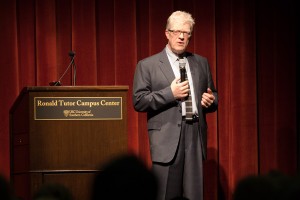TED talk star visits campus
Sir Ken Robinson spoke Tuesday night to a crowd of USC students, faculty and their guests about how the modern educational system neglects students’ natural talents and creativity in the Ronald Tutor Center Grand Ballroom.

Imagine · Sir Ken Robinson is well-known for having the most-watched TED talk in history, in which he urges his audience members to imagine an education system that encourages creativity instead of limiting it. – Matt Zheng | Daily Trojan
“Creativity is a conversation and it’s a very unexpected one,” he said.
Sir Ken Robinson is known for giving the most-watched TED talk of all time on how schools kill creativity, with more than 20 million views from the TED website. He is also the author of numerous books, including The New York Times 2009 bestseller The Element: How Finding Your Passion Changes Everything.
The event was hosted by Academic Culture Assembly of USC Program Board in celebration of EdMonth.
USC Program Board started EdMonth at USC two years ago as the first national student-led movement and discussion about the state of education in our country.
During his lecture, Robinson argued that there are three principles that drive mass education: academic ability, compliance and the false belief that life is linear. These principles, he said, do not foster people’s individual talents.
“I have always believed that human beings have deep natural talents,” Robinson said. “But that most people don’t discover them … The consequence of that is that they never develop those talents.”
Robinson used examples from his life as well as current cultural and technological inventions such as the iPhone and Google Glass to underscore how important creativity is. He also emphasized that creativity and the ability to use imagination is what sets human beings apart from other living organisms.
“Creativity is at the heart of human culture,” he said. “You might call it applied imagination.”
He also discussed how educational systems in Asian countries award students with academic ability, but said that these are areas with the highest amounts of depression among students. He argued for educational reform and said that creative acts and “doing something” should be at the heart of educational systems, rather than academic ability.
“Our education system is obsessed with a certain type of academic conformity,“ he said. “But if all we had is academic ability, most of human culture wouldn’t have happened, would it?”
A revolution, he said, is happening in the world because of technology and demographics. Because of this, he continued, the educational system needs to be rethought with an emphasis on creativity.
A further concern he addressed was how the educational system is currently failing students. He mentioned that 13 percent of students who start the ninth grade do not make it to graduation.
“Sounds like they failed the system,” he said. “[It is] much more probable that the system failed them.”

